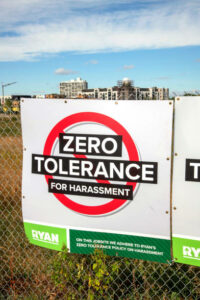
Fighting at work: Dismissal or disciplinary action?
Fighting at work is a scenario that can often lead to a fair dismissal. But depending on the circumstances, it can also see an employee face disciplinary action, a suspension or be stood down from their job. In this article, we provide all you need to know if you’ve been dismissed, suspended, stood down or faced disciplinary action for fighting at work. We’ll answer frequently asked questions that will help you determine if you can challenge your employer’s decision through the Fair Work Commission.
We also look at a recent case involving two police officers who engaged in an ugly fight at work, and later challenged their disciplinary action through the NSW Industrial Relations Commission. (NSWIRC)
Can I be summarily dismissed if I get into a fight at work?
Yes, it is possible to receive a fair summary dismissal for fighting at work. Physical assault is one of the types of behaviour that’s considered serious misconduct by the Fair Work Commission. If you have committed serious misconduct, your employer generally has the right to dismiss you without warning.
What if I didn’t start the workplace fight?
When an employee is dismissed, suspended or stood down by their employer, and challenges the decision at the Fair Work Commission, an argument of self-defence may be considered as a mitigating factor.
However, as you’ll see in the case below, an argument of self-defence is often considered with regard to the manner in which the employee defended themselves. That is, if they used proportionate or excessive force when attempting to do so.

What other factors are considered?
The Fair Work Commission may also consider other extenuating circumstances when an employee challenges their dismissal, suspension, disciplinary action or having been stood down for engaging in a fight at work. This includes:
- The context in which the fight began.
- Your length of service with your employer.
- Your role, including whether you’re in a senior or managerial position.
- Whether you have a history of similar incidents.
- Whether you received procedural fairness.
Can you be dismissed for an out of hours fight with a colleague?
Employers don’t typically have the right to involve themselves in the lives of their employees when they aren’t at work. But in some cases, misconduct and serious misconduct that takes place out of hours can lead to an employee facing consequences from their employer. This can include facing a disciplinary action, suspension, being stood down or even a dismissal.
If you’ve been involved in a fight with a colleague outside of your work hours and workplace, it must meet several criteria for your employer to discipline or dismiss you for it. It must be such that it:
- Is likely to have a deleterious effect upon your relationship with your employer.
- Has brought your employer into disrepute.
- Contrary to your duty as an employee.
You can gain more information about the specifics of out of hours serious misconduct in our comprehensive article.
I’m being investigated for a fight at work – what are my rights?
When an employee is accused of misconduct like getting into a fight at work, the employer is obligated to provide procedural fairness. That is, it must conduct a formal investigation into the circumstances surrounding the allegation.
The employer must clearly outline all the evidence supporting the allegation to the employee. They must also provide the employee with an opportunity to explain their version of events. You can read more about the importance of your procedural fairness rights in our article.

Police officers get into fight at work, face disciplinary action
To better understand the factors considered when an employee challenges their employer’s decision, let’s look at a recent case brought before the Industrial Relations Commission of NSW. The unfair dismissal case – Gough v Commissioner of Police; Rigelsford v Commissioner of Police [2022]. Involves two police officers who got into a particularly ugly fight at work.
The workplace fight took place between Senior Constable Ashley Gough and Leading Senior Constable Lee Rigelsford, who were stationed at the Boggabri Police Station in regional NSW as lockup keepers. Both resided on separate but neighboring police residences with their families. On the night of 6 October 2019, Mr Rigelsford and his family joined Mr Gough and his family at his residence to watch the NRL grand final. Both officers were off duty at the time and they, along with their wives Kate and Jodie, consumed alcohol on the night.
Two officers come to blows in the police station
Late in the evening after the game had finished, Kate and Jodie got into an altercation and the two officers soon got involved. Things got so heated that Mr Gough and Mr Rigelsford came to blows. This developed into a full-blown fight that lasted for a significant period and saw both men sustain physical injuries. While both officers were off duty, because the fight took place on police premises, it was considered a fight at work.
According to the workplace investigation later conducted into the incident, Mr Rigelsford started the fight by punching Mr Gough in the head and body. This caused Mr Gough to wrap his arms around Mr Rigelsford and take him to the ground. Mr Gough then kneed him in the ribs and punched him in the head, causing Mr Rigelsford to briefly fall into unconsciousness and “start snoring…”
A triple zero call was made and both men were transported to nearby hospitals for their injuries. Police from neighbouring towns also attended the scene.

The workplace fight is investigated and the officers face disciplinary action
Prior to taking disciplinary action against both officers, NSW Police Force (NSWPF) conducted an investigation into the workplace fight. In March 2020, it released a 66-page report that concluded Mr Rigelsford threw the first punch. The report also detailed that Mr Gough had used “the force of an assault that appears in excess” to that caused by Mr Rigelsford. The report also stated that both men had failed to comply with the NSWPF Code of Conduct and Ethics.
The code outlines that an officer must, whether on or off duty, comply with the law. And also, behave honestly and in a way that upholds the values and the good reputation of the NSWPF. News of the fight had spread throughout the town, which meant the officers had brought their employer into disrepute. Neither officer was charged with a criminal offence. However, the NSWPF initiated a disciplinary action against them.
Employer takes disciplinary action against the officers for workplace fight
You may think that getting into a workplace fight of this nature on your employer’s property would end in a dismissal for both men. Or at least a suspension or being stood down, particularly given that they brought their employer into disrepute. But instead, Mr Gough and Mr Rigelsford were subject to disciplinary action by the NSWPF.
The disciplinary action required both men to be transferred to other police stations in the region. Mr Gough was handed a transfer to Gunnedah Police Station. While Mr Rigelsford was handed a transfer to Narrabri Police Station. Along with the disciplinary action transfers, both officers were ordered to move out of the police premises in which they resided. They were both paying just $60 in rent per week to live at these premises.
The officers challenge disciplinary action
Mr Gough and Mr Rigelsford subsequently challenged the disciplinary action through the Industrial Relations Commission of NSW, arguing that it was harsh, unreasonable or unjust. In his defence, Mr Gough argued that he had not acted “in contradiction to any values or statements I am required to abide by as a NSW police officer.” He claimed that his actions were “in complete self-defence” of himself, his property and his family.
He stated that moving out of the $60-per-week police residence would impose a huge financial burden on his family. Also, that a move would cause anxiety for his children, who had both been diagnosed with ADHD.
Mr Rigelsford argued that if forced to move out of his police premises. Further it would cause extreme financial hardship given he would need to pay around $550 per week in rent. Mr Rigelsford also said that his eldest son would suffer. He stated that his son, who suffers from autism as well as depression and suicidal tendencies, would need to leave his special school for children with disabilities.

Was the disciplinary action unfair?
At the Industrial Relations Commission of NSW hearing, both officers were cross-examined at length. In one exchange, Mr Rigelsford admitted that the fight brought his employer into disrepute. And Mr Gough admitted that kneeing Mr Rigelsford in the ribs “wasn’t a reasonable thing to do.”
With regard to the disciplinary action undertaken to transfer both officers, Commissioner Murphy found that it was not unreasonable or unjust. However, he did find that it was harsh. His reasoning for this was that the disciplinary action would likely have an adverse effect on both officers’ children. And that it would place a heavy financial burden on their families.
Commissioner Murphy ordered the disciplinary action transfer to be revoked. Instead, he ordered that the officers’ ranks be reduced for two years from the date of his decision. After that time, they will be reinstated to their original positions. For Mr Gough, the reduction in rank for two years will see him lose $50,024 in income. While for Mr Rigelsford, it will cost $6,651 in lost income.

Employee stood down and later dismissed for fight at work
In another unfair dismissal case – Robert Kitchin AND National Fleet Network Pty Ltd [2002] – a mechanic who got involved in a fight at work was stood down and later dismissed. Bob Kitchin, who worked for National Fleet Network, was working on site at P&O Trans Australia – a customer of his employer. After receiving verbal abuse from a P&O employee, Jamie Edwards, Mr Kitchin had stepped onto the forklift Mr Edwards was operating. Mr Edwards then launched himself at Mr Kitchin and a physical fight ensued.
As a result of the workplace fight, Mr Kitchin was not immediately dismissed, but instead stood down with full pay while National Fleet conducted an investigation. The company had policies in place that explicitly prohibited employees from engaging in workplace fights – whether verbal or physical. National Fleet argued that Mr Kitchin fully understood these policies, which outlined that engaging in a workplace fight could result in a summary dismissal. Mr Kitchin had signed an employment contract that referred to the policies.
National Fleet conducts investigation while Employee is stood down
In this case, National Fleet did its due diligence when it came to procedural fairness. While Mr Kitchin was stood down, National Fleet conducted interviews with witnesses of the workplace fight. Mr Kitchin was also provided the chance to provide his version of events in a written statement. He was asked if he started the workplace fight, why he reacted in the way he did, and whether he had previously been involved in a similar incident.
National Fleet considered several options before deciding to dismiss Mr Kitchin, including taking disciplinary action. And prior to dismissing him, the company took measures to ensure procedural fairness. This included interviewing Mr Kitchin and telling him that they were considering dismissing him. National Fleet also ensure a support person was present during this interview.

Mr Kitchin has his unfair dismissal application rejected
Following his dismissal, Mr Kitchen made an unfair dismissal application through the Queensland Industrial Relations Commission. (QIRC) He argued that his actions were made only in self-defence and that National Fleet had not provided procedural fairness.
Mr Kitchen stated that the investigation undertaken by his former employer was flawed, failing to give adequate consideration to his version of events. The Queensland Industrial Relations Commission, however, rejected Mr Kitchen’s arguments. It found that he was provided procedural fairness and that Mr Kitchen was fully aware that fighting at work was a contravention of National Fleet’s policies. Mr Kitchen’s bid to have his job reinstated therefore failed, as his dismissal was not considered harsh, unjust or unreasonable.
Conclusion: Have you been involved in a fight at work?
If you’ve faced unfair consequences for getting involved in a workplace fight, A Whole New Approach can help. Whether you faced a disciplinary action, a suspension, were stood down or dismissed, we can help challenge your unfair treatment through the Fair Work Commission.
We at A Whole New Approach are Australia’s leading workplace mediators. AWNA has over two decades’ experience helping workers in every state and territory make unfair dismissal claims. We offer a no win, no fee service and your first consultation with us is free. Look up some of the recent cases we have run, click here
Call us today on 1800 333 666 for a confidential discussion about your circumstances.
Articles similar to: Fighting at work: Dismissal or disciplinary action?
Biased Workplace Investigation how to respond






